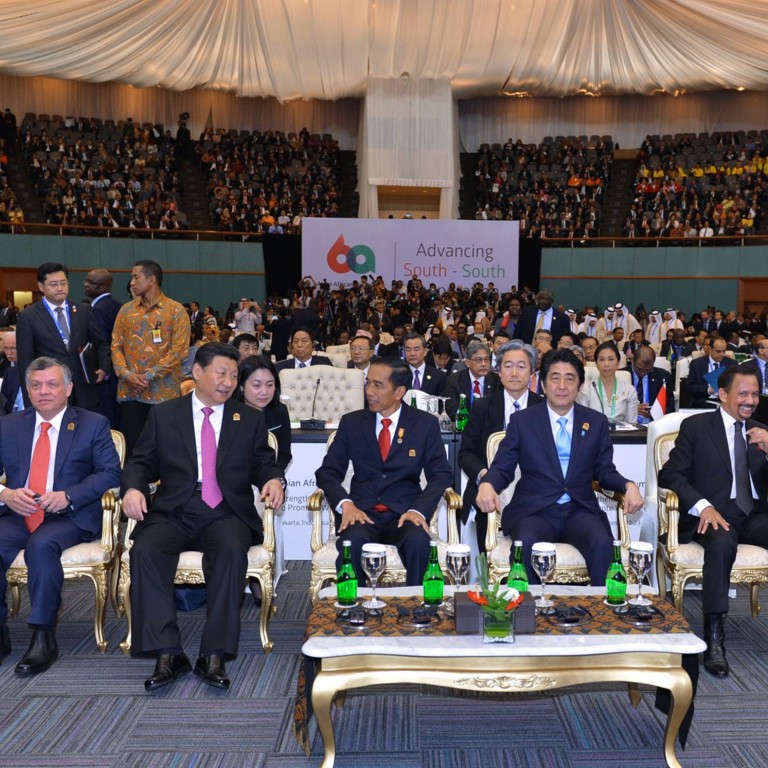
China’s President Xi Jinping to meet Japanese PM Shinzo Abe today
Latest sign of thaw in relations between Asian rivals as Japanese government says two leaders to meet on sidelines of Asia-Africa summit in Indonesia
Japanese Prime Minister Shinzo Abe will meet President Xi Jinping on the sidelines of an Asia-Africa summit in Indonesia today, a Japanese government official said, the latest sign of a thaw in relations between the Asian rivals.
However, speaking at the summit ahead of the expected meeting, Abe warned powerful nations against imposing on the weak, an implicit reference to China. He also made an allusion to Tokyo’s remorse in the past over World War Two without issuing a fresh apology.
Abe’s comments made it an awkward diplomatic backdrop for the expected meeting with Xi. But a Japanese official said ahead of Abe’s address that the two leaders would meet later in the day. The Chinese foreign ministry said it had no information on the subject.
“[China] is shifting to a policy of stressing that it hopes for stable relations with its neighbours,” said Hiroko Maeda, a research fellow at the PHP Institute in Tokyo.
Tensions between Asia’s two biggest economies have flared in recent years due to feuds over wartime history as well as territorial rows and regional rivalry. Memories of Japan’s past military aggression run deep in China and Beijing has repeatedly urged Japan to face up to history.
“We should never allow to go unchecked the use of force by the mightier to twist the weaker around,” Abe said at the summit marking the 60th anniversary of the Bandung Conference, a meeting of Asian and African leaders opposed to colonialism.
“The wisdom of our forefathers in Bandung was that the rule of law should protect the dignity of sovereign nations, be they large or small,” Abe said, speaking after Xi had addressed the conference.
Japanese Chief Cabinet Secretary Yasuhide Suga told reporters earlier that he hoped Abe and Xi would meet in Jakarta, although precise details of the encounter had not been decided. Abe managed to secure a handshake with Xi at a photo opportunity for leaders at the start of the conference. NHK reported they would meet at about 4.30pm Tokyo time.
Abe’s stance on Japan’s wartime past is especially sensitive this year, when he plans to issue a statement marking the 70th anniversary of the end of the second world war.
He has said that while he will uphold past apologies including a 1995 landmark statement by then-premier Tomiichi Murayama, he wants to issue forward-looking remarks in his own words, sparking concern he wants to water down past apologies.
Hours before Abe spoke, scores of ruling party and opposition lawmakers visited Tokyo’s Yasukuni Shrine, where wartime leaders are honoured. The shrine is seen as a symbol of Japan’s past militarism by many in China. Abe himself sent a ritual offering to Yasukuni the day before.
“In this sensitive year, Japanese politicians should adhere to correct historical views and do more to promote reconciliation and mutual trust with Asian neighbours, and not the opposite,” said China’s foreign ministry spokesman Hong Le.
A failure to show sufficient regret may cost Abe the opportunity to bolster a fragile recovery in ties with China, the country’s biggest trading partner.
“The relationship between China and Japan is in a very complex situation as the two sides are seeking to maintain or even to enhance the dialogue,” said Liu Jiangyong, vice director of the Modern International Relations Institute at Tsinghua University in China.
“But there are so many uncertainties that could damage the fragile relationship.”
